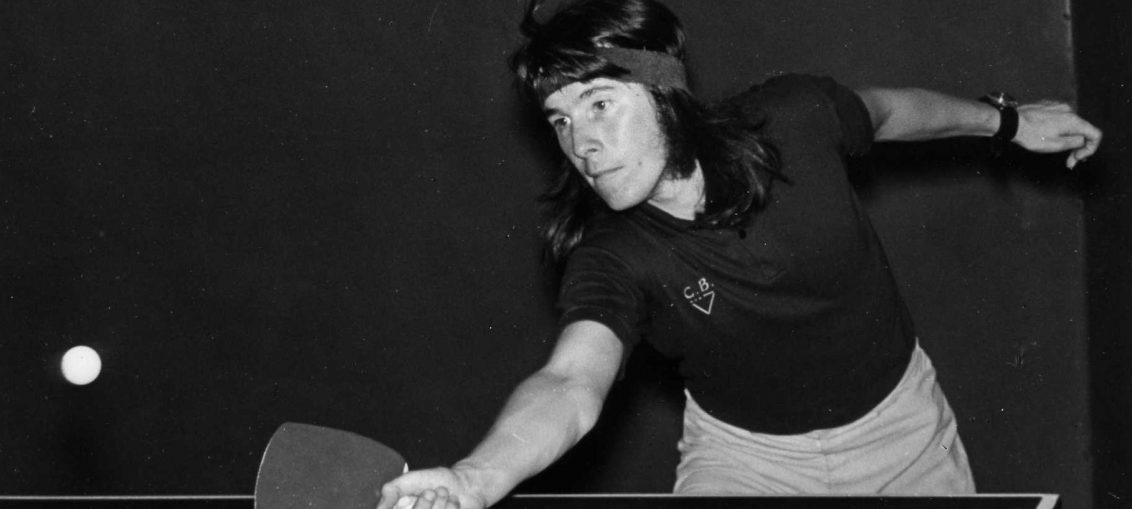
Chester Barnes, the racket his trademark
by Diane Webb & Ian Marshall
England international, Chester Barnes passed away on Thursday 18th March; born on Monday 27th January 1947 in Forest Gate, east London, he was 74 years old. He died of a heart attack.
Always known as Chester but in fact legally George. The legend is that his father suggested “Chester” after the entertainer, Charlie Chester, one of the most celebrated comedians, radio and later television presenters of the era; a man who could talk the hind leg off a donkey!
Perhaps it suited, Chester Barnes was no mean conversationalist.
It was an era when England needed a table tennis star; Diane and Rosalind Rowe, alongside Johnny Leach, being world champions were household names, but they needed a successor, someone who could attract the attention of the media, the general sporting public.
Enter Chester Barnes, he fulfilled the role but in a rather different manner.
In January 1963, he entered the English National Championships in London, the finals televised on BBC; that fact alone underlines the status in those days of table tennis in England. ITV was an alternative but present in very few households, BBC was really the only option.
Against the odds, Chester won the men’s singles event, just three weeks prior to his 16th birthday to this day the youngest winner ever; he retained the title in 1964 and 1965.
Very much Chester was at the vanguard of a new technical era in the sport.
In 1960 Stan Jacobson had returned to England from Japan, a new stroke the “loop”, forehand top spin. It suited Chester to perfection.
Moreover, as bright as a button, Chester saw opportunities and developed his own racket, the blade square shape. Various theories were promoted at the time, one being that if one side of the racket was straight, more top spin could be imparted on the ball!
Rubbish, but I was very quick in 1965 to order my Chester Barnes racket at the princely sum of £1.25s.6d from Alec Brook Sports in Euston Road, London; that’s about £1.27 in decimal terms, with inflation approaching £20.00 in modern day money.
An opportunity and another, it was the “swinging sixties”, the Beatles were a sensation, sporting personalities emerged who made their feelings known and went beyond the bounds of sport. None more so than a certain Cassius Clay. He arrived in England in 1963 and proclaimed, he was the “greatest” prior to his fight with Henry Cooper. George Best, the Manchester United footballer became a fashion trendsetter.
Chester was not to be left out. Mischievous, he saw a chance to hit the headlines. He issued words to the effect “rank me number one or I will never play for England again!”
The story goes that he knew he would be number one before making the statement!
Conjecture, outspoken but we loved him for it; he courted controversy. He was news!
Later in 1971 when advised that following the Commonwealth Championships in Singapore and the World Championships in Nagoya, it may be necessary to stay longer in the Japanese city, alongside Denis Neale, he withdrew from the England team.
Maybe an error of judgement; England received an invitation to visit China. Ping Pong Diplomacy was born, Chester Barnes sadly missed out.
Retired from table tennis, he became assistant to Martin Pipe, the British National Hunt Racehorse trainer. Interviews requested but declined, he left table tennis behind, somewhat sad.
Did he fulfil his potential as a table tennis player? The jury is out but one fact is certain his enigmatic character engaged all, the sport of table tennis was the better for his presence, his name had a poetic ring, it stood out, hear it once and instantly remembered.
A true personality, did he ever realise how important he was to the sport of table tennis?
Chester Barnes rest in peace.
• Table Tennis England – Obituary, Chester Barnes by Paul Stimpson and Diane Webb
• Table Tennis England –Chester Barnes the Great Enigma by Diane Webb
